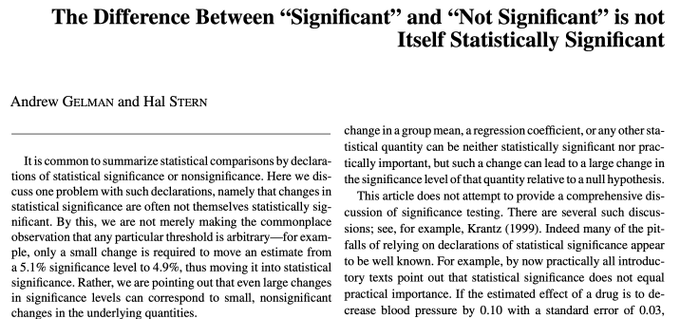
Carlisle Rainey
@carlislerainey
Followers
2,144
Following
776
Media
397
Statuses
1,984
👋 plaudit-winning author 🆕 sharing social science and methods 🧪 thoughts on #openscience 👨🏫 political scientist at FSU 💪 proponent of p-values
Tallahassee, FL
Joined June 2021
Don't wanna be here?
Send us removal request.
Explore trending content on Musk Viewer
Georgia
• 333728 Tweets
Michigan
• 306464 Tweets
Texas
• 225331 Tweets
Never Trump
• 144697 Tweets
Tennessee
• 132555 Tweets
Francis
• 96235 Tweets
Arnold Palmer
• 81381 Tweets
Usher
• 73913 Tweets
Inter Miami
• 60107 Tweets
#precure
• 54603 Tweets
Romero
• 52705 Tweets
#仮面ライダーガヴ
• 44641 Tweets
Gago
• 44201 Tweets
Rojo
• 39577 Tweets
Bama
• 35760 Tweets
Hulk
• 35533 Tweets
Arch
• 30994 Tweets
Stanton
• 29615 Tweets
Tigre
• 25572 Tweets
#ブンブンジャー
• 22990 Tweets
Milroe
• 20994 Tweets
Beck
• 18838 Tweets
Riquelme
• 17128 Tweets
Saban
• 17094 Tweets
Vegetti
• 15331 Tweets
#UFCVegas99
• 14796 Tweets
Ewers
• 13962 Tweets
KARIME EN PALAZZO
• 12884 Tweets
Medina
• 11433 Tweets
Coutinho
• 10260 Tweets
Last Seen Profiles
Pinned Tweet
🎉Conditionally accepted
@polanalysis
:
"The Limits (and Strengths) of Single-Topic Experiments"
w/
@ScottClif
We've got three goals with this one... 👇
5
44
133
Do you use logistic regression? If so, you’ll want to read the thread below.
⚠️ Warning: Memes, charts,
#rstats
, and practical advice ahead.
15
148
748
An excellent discussion of academic talks from
@wc_ratcliff
.
I hadn’t realized the official version was out. I’ve been sharing an older version of this for years, and this one is even better
Gated HTML:
Gated PDF:
2
120
599
Here's a great paper from Julia Rohrer (
@dingding_peng
) that I like to assign in my classes. It's more general than this, but I assign it to answer "when can we interpret regression coefficient estimates as causal effects?"
2
82
538
Really thoughtful paper on handling (and planning for) results that are not statistically significant.
#OpenAccess
from
@JEPS_Ed
-
More than meets the ITT: A guide for anticipating and investigating nonsignificant results in survey experiments -
-
@UptonOrwell
#FirstView
0
29
68
2
68
352
Source:
8
52
299
One of my favorite recent papers is Kane (2024).
While pitched (effectively and usefully) as a paper about compelling null results, many of the action items are ways to boost power.
IMO, it provides a great checklist to make sure you're maximizing power.
CC:
@UptonOrwell
2
52
250
Folks, I finally tested out
@VincentAB
's {marginaleffects}
#rstats
package. It is awesome!
In this blog post, I use the comparisons() and hypotheses() functions to reproduce the example equivalence tests from my 2014 AJPS. It is super easy and intuitive.
3
42
215
Arel-Bundock et al. (2022)
“Quantitative Political Science Research is Greatly Underpowered”
Preprint:
CC:
@VincentAB
,
@ryancbriggs
,
@marcomavina
2
48
193
In practice, that means using the {brglm2} package rather than glm().
And Twitter will love this! {brglm2} works with
@VincentAB
’s {marginaleffects} package and
@noah_greifer
’s {clarify} package.
5
11
157
I hadn't seen this from Gelman and friends in
@NEJMEvidence
They use 23,000 RCTs from the Cochrane Database of Systematic Reviews and ask:
given a certain p-value, what sort of study have we drawn from the distribution?
3
30
152
With an eye toward
#SPSA2024
, here are some rules that I made for myself as a presenter.
*I cannot promise that I follow these rules. Also, these are rules for *me*; you do you.
2
37
119
"Addressing Measurement Errors in Ranking Questions for Social Sciences"
From
@Yuki_Atsusaka
and
@sysilviakim
A great example of a methods paper that combines statistical theory and empirical data to develop best practices for design.
@socarxiv
version:
3
39
113
Four new(ish) papers on measuring affective polarization: A thread 🧵
"[The] feeling thermometer measure is in fact so tied to the concept of affective polarization that often it is simply referred to as affective polarization." (from Paper
#4
below)
5
22
85
Strand (2023) "Error Tight"
"this article draws on lessons from high-risk fields such as aviation, surgery, and construction, all of which have developed explicit, practical strategies to reduce mistakes on the job."
PDF:
CC:
@juliafstrand
1
16
82
"Estimators for Topic-Sampling Designs" is now out in
@polanalysis
DOI:
In this paper, we motivate and justify hierarchical models for analyzing experiments that assign respondents to several designs in parallel--what we call "topic sampling."
1
23
78
Great new preprint from
@BCEgerod
and
@fhollenbach
.
Nice contribution to the popular staggered DiD literature--focusing (appropriately, in my view) on the cost of increased variance.
Preprint:
3
15
80
Cool new paper from
@JakeJares
and
@namalhotra
, conditionally accepted at
@apsrjournal
.
PDF:
This paper is a helpful example of a careful argument for a "null result"; see esp. pp. 27-32.
3
15
72
🎉 Conditionally accepted at Political Analysis!
🙏 Thanks to another set of thoughtful reviewers that made the paper better.
4
5
71
"News Sharing on Social Media: Mapping the Ideology of News Media, Politicians, and the Mass Public"
DOI:
I was most interested in this paper's estimates the ideology of media orgs.
From
@GregoryEady
,
@RichBonneauNYC
,
@j_a_tucker
,
@Jonathan_Nagler
1
18
70
I noticed that
@Matt__Graham
borrowed my Quarto listings code to list his many (great) papers on his research page. His page looks great!
I spent a little time thinking about the best way to list these, so feel free to borrow.
Links below! 👇
1
9
67
In political science, it’s common to interpret the substantive effect for statistically significant point estimates.
We call that “magnitude-and-significance.”
We wrote a little essay about that practice:
1
17
66
🥳New Version!
"Data and Code Availability in Political Science Publications from 1995 to 2022"
Now conditionally accepted at
@ps_polisci
w/ Harley Roe (
@RoeHarley
), Qing Wang, and Hao Zhou
1
18
61
Cool paper on hypothesis testing. It popped up on my Google Scholar feed a few days ago and I gave it a quick read. It’s really cool!
Of course, the setup of hypothesis test depends on the substantive purpose, so there’s room to quibble there. But good paper to build intuition.
[Rethinking Hypothesis Tests] I usually only advertise my papers after they are accepted for publication.
But I like this paper (with
@kuben45
@FernandoColug
@rflassance
@altayals
@rbstern
) so much that I'll do it now.
1/n
7
35
129
2
7
55
Here’s a hill I’m prepared to defend: ⛰️
LPM predictions outside [0, 1] are not usually problematic and people make too much of this “shortcoming.”
@PhDemetri
I totally get it.
So long as your predictions are contained in [0, 1], LPMs are usually fine. But it's still 110% okay to make fun of them
2
1
21
9
0
46
An interesting question emerged in the comments yesterday:
How should a priori power should affect our interpretation of the results?
(h/t
@IsabellaGhement
)
tl;dr: a priori power should NOT affect our interpretation of results. But caveats apply.
Links below 👇
3
8
43
@dandekadt
3 things come to mind from my experience:
1. Researchers vary substantially in how much they fight with a nearly finished paper to make it a tiny bit better.
2. Co-authorship saves a lot of time.
3. Writing a series of related papers saves A LOT of time.
1
1
45
Alright, academics! Let’s discuss:
What unconventional, heterodox, or controversial advice would you give to your more junior colleagues?
I’m looking for advice that conflicts with standard, conventional wisdom.
Quote this tweet with your thoughts!
#AcademicTwitter
16
9
43
I need Twitter’s help!
Please share some examples of academic websites built with quarto.
Self-nomination encouraged!
I’m working on a blog post about this, and some examples would be great. It’s surprising hard to find examples with Google.
#rstats
#AcademicTwitter
14
11
43
What are we up to in social science?
I think it's answering this question: "How can we intervene to make the world a better place?" This question has descriptive, causal , and normative aspects.
I really like
@cdsamii
's take on this.
6
7
41
My paper comparing averaged simulations to directly transformed point estimates is published in the latest issue of
@PSRMJournal
(along with lots of other great papers!).
1
5
39
Important new paper for IR and experimental design generally from
@BassanNygate
,
@chagai_weiss
, and others.
"The Generalizability of IR Experiments Beyond the U.S."
"findings from the U.S. are similar to findings from a wide range of democracies"
📄:
2
16
35
Matt Graham (
@Matt__Graham
) on "catch" or "trap" questions in surveys.
Catch Q: "In what year did the U.S. Supreme Court decide Geer v. Connecticut?"
1
8
34
🆕 "The Data Availability Policies of Political Science Journals" is on
@socarxiv
1️⃣ 20% of political science journals require sharing data.
2️⃣We should remain mindful of the effectiveness and rarity of requiring data sharing.
👇links + discussion below
1
16
34
🚨 New Post Alert 🚨
❝The Rule of 3.64 for Statistical Power❞
I don’t find power an intuitive, actionable summary of a design. Instead, I like the ratio of the true effect to the standard error.
#rstats
#AcademicTwitter
🚀Don't forget to ❤️+ RT!🚀
3
7
31
After a lot of investigation, I decided that the answer is Dataverse (
@dataverseorg
).
3
0
30








































































































